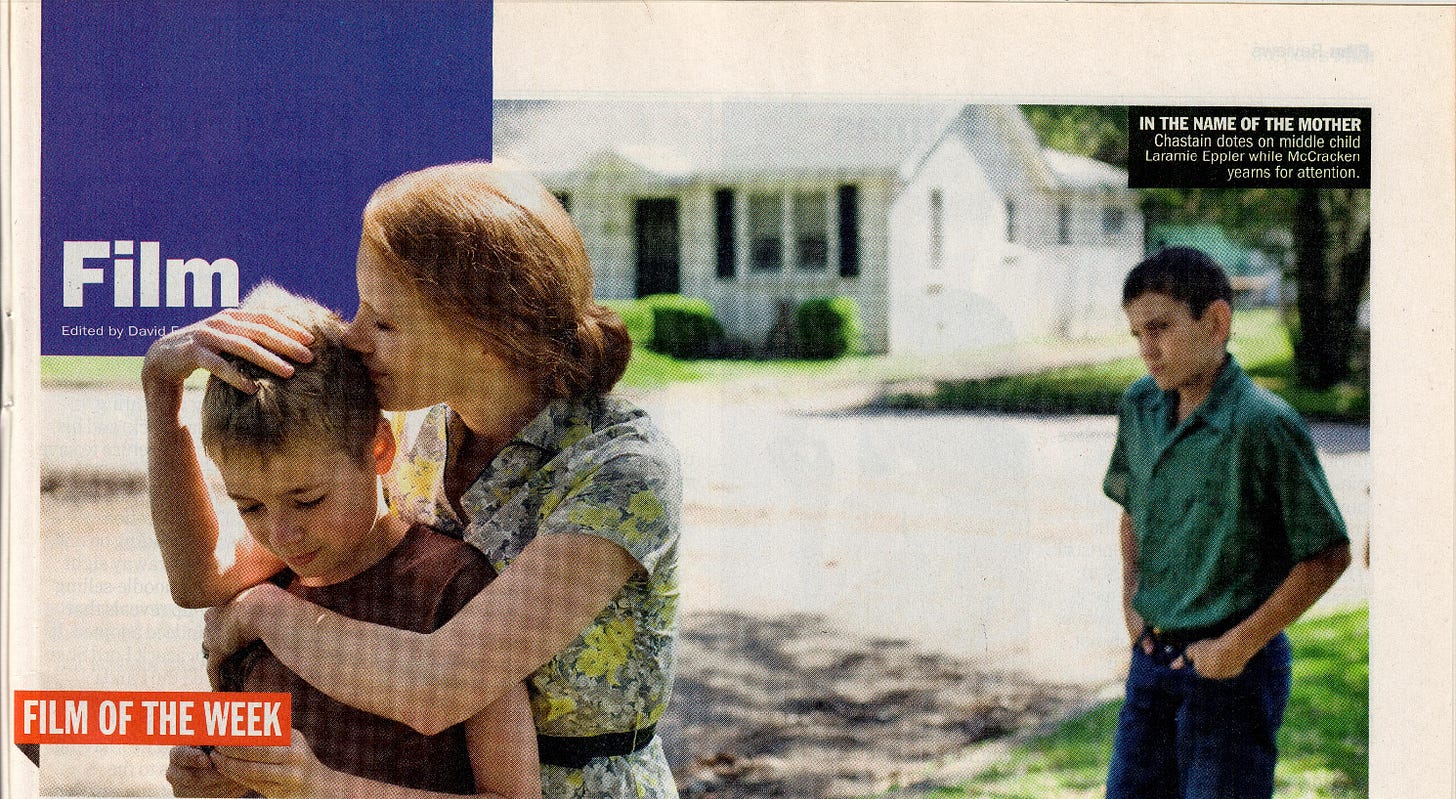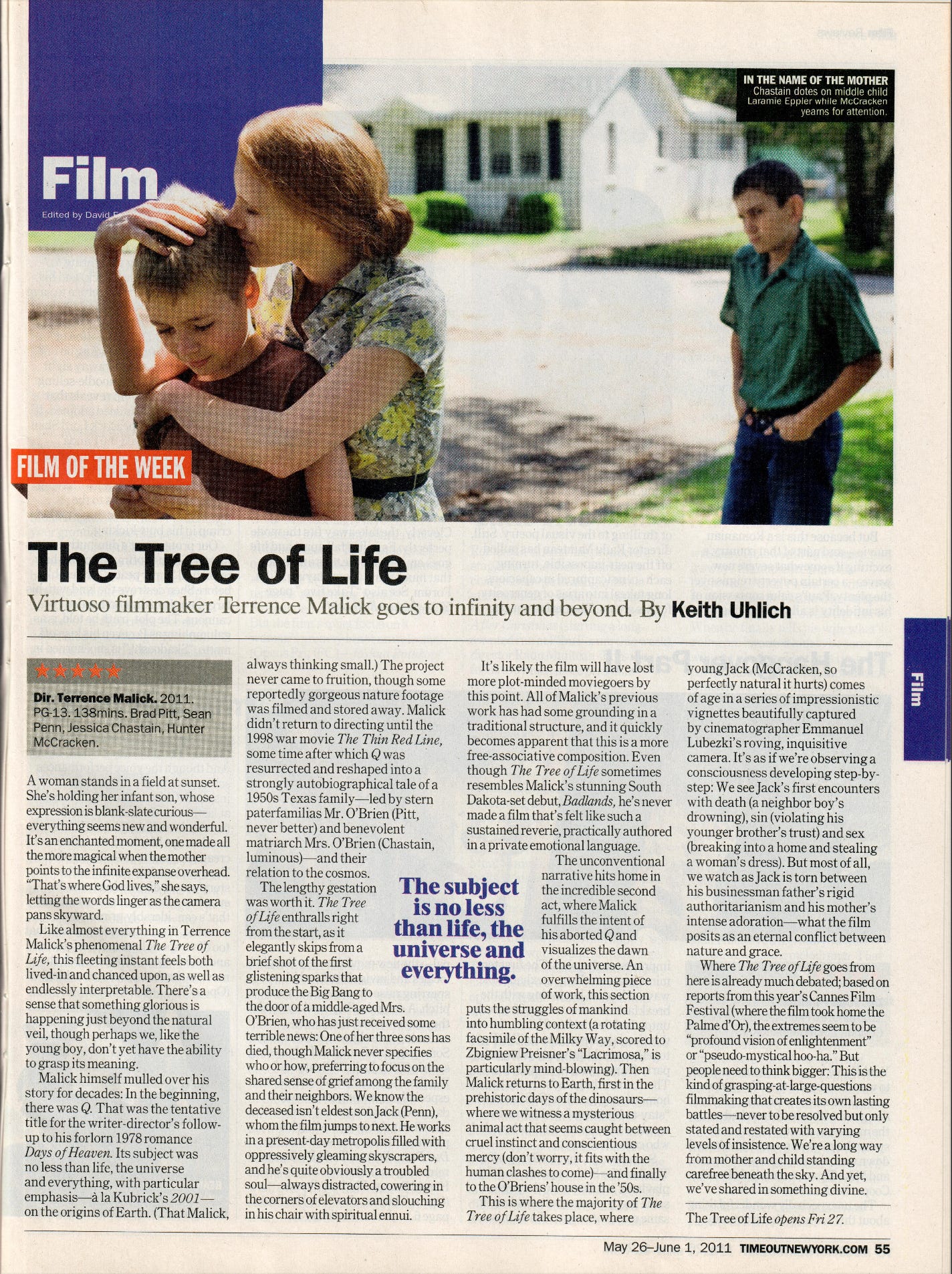★★★★★
Dir. Terrence Malick. 2011. PG-13. 138mins. Brad Pitt, Sean Penn, Jessica Chastain, Hunter McCracken.
Virtuoso filmmaker Terrence Malick goes to infinity and beyond.
A woman stands in a field at sunset. She’s holding her infant son, whose expression is blank-slate curious — everything seems new and wonderful. It’s an enchanted moment, one made all the more magical when the mother points to the infinite expanse overhead. “That’s where God lives,” she says, letting the words linger as the camera pans skyward.
Like almost everything in Terrence Malick’s phenomenal The Tree of Life, this fleeting instant feels both lived-in and chanced upon, as well as endlessly interpretable. There’s a sense that something glorious is happening just beyond the natural veil, though perhaps we, like the young boy, don’t yet have the ability to grasp its meaning.
Malick himself mulled over his story for decades: In the beginning, there was Q. That was the tentative title for the writer-director’s follow-up to his forlorn 1978 romance Days of Heaven. Its subject was no less than life, the universe and everything, with particular emphasis — à la Kubrick’s 2001 — on the origins of earth. (That Malick, always thinking small.) The project never came to fruition, though some reportedly gorgeous nature footage was filmed and stored away. Malick didn’t return to directing until the 1998 war movie The Thin Red Line, some time after which Q was resurrected and reshaped into a strongly autobiographical tale of a 1950s Texas family — led by stern paterfamilias Mr. O’Brien (Pitt, never better) and benevolent matriarch Mrs. O’Brien (Chastain, luminous) — and their relation to the cosmos.
The lengthy gestation was worth it. The Tree of Life enthralls right from the start, as it elegantly skips from a brief shot of the first glistening sparks that produce the Big Bang to the door of a middle-aged Mrs. O’Brien, who has just received some terrible news: One of her three sons has died, though Malick never specifies who or how, preferring to focus on the shared sense of grief among the family and their neighbors. We know the deceased isn’t eldest son Jack (Penn), whom the film jumps to next. He works in a present-day metropolis filled with oppressively gleaming skyscrapers, and he’s quite obviously a troubled soul — always distracted, cowering in the corners of elevators and slouching in his chair with spiritual ennui.
It’s likely the film will have lost more plot-minded moviegoers by this point. All of Malick’s previous work has had some grounding in a traditional structure, and it quickly becomes apparent that this is a more free-associative composition. Even though The Tree of Life sometimes resembles Malick’s stunning South Dakota-set debut, Badlands, he’s never made a film that’s felt like such a sustained reverie, practically authored in a private emotional language.
The unconventional narrative hits home in the incredible second act, where Malick fulfills the intent of his aborted Q and visualizes the dawn of the universe. An overwhelming piece of work, this section puts the struggles of mankind into humbling context (a rotating facsimile of the Milky Way, scored to Zbigniew Preisner’s “Lacrimosa,” is particularly mind-blowing). Then Malick returns to Earth, first in the prehistoric days of the dinosaurs — where we witness a mysterious animal act that seems caught between cruel instinct and conscientious mercy (don’t worry, it fits with the human clashes to come) — and finally to the O’Briens’ house in the ’50s.
This is where the majority of The Tree of Life takes place, where young Jack (McCracken, so perfectly natural it hurts) comes of age in a series of impressionistic vignettes beautifully captured by cinematographer Emmanuel Lubezki’s roving, inquisitive camera. It’s as if we’re observing a consciousness developing step-by-step: We see Jack’s first encounters with death (a neighbor boy’s drowning), sin (violating his younger brother’s trust) and sex (breaking into a home and stealing a woman’s dress). But most of all, we watch as Jack is torn between his businessman father’s rigid authoritarianism and his mother’s intense adoration — what the film posits as an eternal conflict between nature and grace.
Where The Tree of Life goes from here is already much debated; based on reports from this year’s Cannes Film Festival (where the film took home the Palme d’Or), the extremes seem to be “profound vision of enlightenment” or “pseudo-mystical hoo-ha.” But people need to think bigger: This is the kind of grasping-at-large-questions filmmaking that creates its own lasting battles — never to be resolved but only stated and restated with varying levels of insistence. We’re a long way from mother and child standing carefree beneath the sky. And yet, we’ve shared in something divine.—Keith Uhlich



